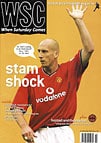 Gavin Barber attempts to explain how a loping Ipswich youngster became a cult hero at his hometown club but a figure of fun almost everywhere else
Gavin Barber attempts to explain how a loping Ipswich youngster became a cult hero at his hometown club but a figure of fun almost everywhere else
Football is littered with underachievers, players who are shoved into the spotlight at an early age like American prom queens with dreams of Hollywood, and end up on the sport’s equivalent of the shopping mall circuit. Anyone could instantly reel off a list of their club’s past players who fit this description (unless you support Manchester City, in which case it might be quicker to list the ones who don’t). But the Jason Dozzell story is somehow more odd than simply to merit some weary epithet about “not living up to his potential”. Many of those who observed his career at close quarters from an early stage found him an utterly compelling footballer to watch; the rest of the world will probably never understand why.
Spurs fans will scoff at this, but I was distraught when Jason Dozzell left Ipswich in 1993. I went out with a mate and we got absolutely smashed. When I got home I wrote a hugely melodramatic piece for the fanzine I was running at the time, mourning his departure. When sober, I stupidly decided to print this without any editing, but it did betray a certain truth, which was that for a lot of Ipswich fans, Dozzell’s departure was more than the inevitable loss of a home-grown product to a big-city rival –‑it was somehow more personal than that.
Jason Dozzell was 16 when he made his Ipswich debut, getting the third goal in a 3-1 win over Coventry in 1984, and he is still the youngest player to score in the top flight. But the team was in decline and went down two years later. Among the dross of the Second Division years that followed (and there was a lot of it), Dozzell clearly stood out. But it was difficult to explain to an outsider exactly why this was. To the casual observer he was slow and uncoordinated. To the dwindling number of regulars at Portman Road he was indisputably a misunderstood genius.
The attachment Ipswich fans felt towards Dozzell grew stronger with each dismal season under John Duncan. It wasn’t just that he was a local boy, it was that he somehow embodied a more cultured ethos, completely at odds with Duncan’s hoof-and-hope tactics. There was some strange synergy between Dozzell and the blue shirt that seemed to elevate him to a higher footballing plane and gave fans the odd glimpse, tantalising but real, of the stylish play to which they had previously been accustomed. In short, during that period, Jason Dozzell was more Ipswich Town than Ipswich Town themselves.
Dozzell’s talents were more effectively harnessed under John Lyall and Town went up in 1992. A year later, Ossie Ardiles came calling and Jason was off to the Lane. And we knew it wouldn’t work. It wasn’t just sour grapes at losing our best player – we knew his essential Dozzell-ness couldn’t exist outside a Town shirt. The chemistry required both elements to be present and they were now separated by the A12. We knew the Spurs fans would take one look at the lanky, loping Suffolk boy with the vacant expression and be instantly bemused as to how his name could ever have been juxtaposed with words like “England prospect”.
Which was pretty much what happened. Spurs fans never understood why nearly £2 million had been spent on Dozzell, and he quickly became a figure of scorn in the stands and the fanzines. He drifted out of the team, got injured and hit the tabloids when an incident in an Ipswich bar, which famously involved a cake being flung across the room from Dozzell’s corner, resulted in a drink-driving charge. In 1997 he made a brief attempt at an Ipswich comeback, but no contract was forthcoming and he was soon on his way to the Layer Road retirement home. In August he announced his retirement due to a persistent toe injury.
He looked a bit gormless. He had a silly name and an even sillier running style. These things, ammunition for Spurs fans inclined to ridicule him, only added to his appeal at Ipswich. We must have known subconsciously that the strength of our attachment to him lay in the rare fact that it was a genuinely mutual one: without Dozzell, Ipswich were a poorer side, and without Ipswich, Dozzell barely existed as a footballer. If only he’d known that himself.X
From WSC 176 October 2001. What was happening this month
Sounds like what could have happened to Le Tissier if he had ever left Southampton.